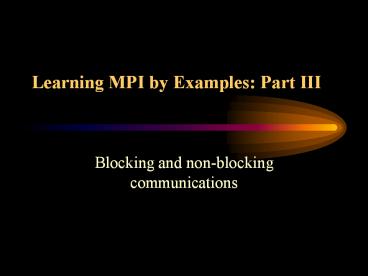Learning MPI by Examples: Part III - PowerPoint PPT Presentation
1 / 16
Title:
Learning MPI by Examples: Part III
Description:
Trap function is used to calculate. local integral ... Add up the integrals calculated by each process ... The intergal calculated from process 4 is 0.039714 ... – PowerPoint PPT presentation
Number of Views:94
Avg rating:3.0/5.0
Title: Learning MPI by Examples: Part III
1
Learning MPI by Examples Part III
- Blocking and non-blocking communications
2
Learning MPI by Examples Part III
- Previous parallel programming with MPI blocking
Send/Receive, which means - process 1 (or processes other than 0) is ready
for receiving message from process 0. Once it is
ready, it deserve for receiving. If process 0
doesn't send a message, the process 1 is idle and
waiting for receiving the message - it is not synchronous communication, which means
sender would send message until it receives
confirmation from receiver
3
Learning MPI by Examples Part III
- blocking communication should be avoid
- The use of non-blocking communication can be used
to provide dramatic improvements in the
performance of message passing programs - Use MPI_Isend() and MPI_Irecv()
- I stands for immediate
- Use MPI_Wait() to complete the non-blocking
communication
4
Learning MPI by Examples Part III
- Parallel programming with MPI non blocking
Send/Receive - do not make processes idle
- Using the following MPI functions
- MPI_Init and MPI_Finalize
- MPI_Comm_rank
- MPI_Comm_size
- MPI_Irecv
- MPI_Isend
- MPI_Wait()
5
Learning MPI by Examples Part III
- MPI _ISend() syntax
int MPI_ISend ( void buffer /in /, int
count / in /, MPI_Datatypes /in
/, int dest /in/, int tag
/in/, MPI_Comm comm /in/ MPI_Request
request /out /)
6
Learning MPI by Examples Part III
- MPI _IRecv() syntax
int MPI_IRecv ( void buffer /in /, int
count / in /, MPI_Datatypes /in
/, int source /in/, int tag
/in/, MPI_Comm comm /in/ MPI_Request
request /out /)
7
/ nbtrap.c -- Parallel Trapezoidal Rule,
nonblocking sending Input None. Output
Estimate of the integral from a to b of f(x)
using the trapezoidal rule and n trapezoids.
Algorithm 1. Each process calculates
"its" interval of integration. 2.
Each process estimates the integral of f(x)
over its interval using the trapezoidal
rule. 3a. Each process ! 0 sends its
integral to process 0. 3b. Process 0 sums
the calculations received from the
individual processes and prints the result.
8
Notes 1. f(x), a, b, and n are all
hardwired. 2. The number of processes (p)
should evenly divide the number of
trapezoids (n 1024) / include
ltstdio.hgt / We'll be using MPI routines,
definitions, etc. / include "mpi.h" main(int
argc, char argv) int my_rank
/ My process rank / int
p / The number of processes /
float a 0.0 / Left endpoint
/
9
float b 1.0 / Right endpoint
/ int n 1024 / Number of
trapezoidsi in each
subintegrals / float h
/ Trapezoid base length / / local_a and
local_b are the bounds for each integration
performed in individual process / float
local_a / Left endpoint my process /
float local_b / Right endpoint my
process / float local_h /
trapezoid base length for
each subintegral / float
integral / Integral over my interval /
float total / Total integral
/ int source / Process
sending integral / int dest 0
/ All messages go to 0 / int
tag 0
10
MPI_Status status MPI_Request
send_req / Trap function prototype. Trap
function is used to calculate local integral
/ float Trap(float local_a, float local_b,
int local_n) / Let the system do what it
needs to start up MPI / MPI_Init(argc,
argv) / Get my process rank /
MPI_Comm_rank(MPI_COMM_WORLD, my_rank) /
Find out how many processes are being used /
MPI_Comm_size(MPI_COMM_WORLD, p)
11
h (b-a)/n / h is the same for all
processes / local_h h/p / So is the
number of trapezoids / local_a a
my_ranklocal_hn local_b local_a
local_hn integral Trap(local_a, local_b,
n) if (my_rank 0) / Add up
the integrals calculated by each process /
total integral / this is the intergal
calculated by process 0 / for (source 1
source lt p source)
MPI_Recv(integral, 1, MPI_FLOAT, source, tag,
MPI_COMM_WORLD, status)
total total integral
12
else printf("The intergal
calculated from process d is f\n",my_rank,integ
ral ) / MPI_Send(integral, 1, MPI_FLOAT,
dest, tag, MPI_COMM_WORLD) /
MPI_Isend(integral, 1, MPI_FLOAT, dest, tag,
MPI_COMM_WORLD,send_req)
MPI_Wait(send_req, status) / Print
the result / if (my_rank 0)
printf("With n d trapezoids, our estimate\n",
n) printf("of the integral from f to f
f\n",a,b,total)
13
/ Shut down MPI / MPI_Finalize() f
loat Trap ( float local_a / in /,
float local_b / in /, int
local_n / in /) float integral
/ Store result in integral / float x
int i float local_h float f(float x)
/ function we're integrating /
14
local_h(local_b-local_a)/local_n
integral (f(local_a) f(local_b))/2.0 x
local_a for (i 1 i lt local_n-1 i)
x x local_h integral
integral f(x) integral
integrallocal_h return integral
15
float f(float x) float return_val
/ Calculate f(x). / / Store calculation
in return_val. / return_val xx
return return_val / f /
16
Learning MPI by Examples Part II
- Example of parallel programming using non
blocking Sending
mpirun -np 8 a.out The intergal calculated from
process 4 is 0.039714 The intergal calculated
from process 5 is 0.059245 The intergal
calculated from process 7 is 0.110026 The
intergal calculated from process 2 is
0.012370 The intergal calculated from process 3
is 0.024089 The intergal calculated from process
1 is 0.004557 The intergal calculated from
process 6 is 0.082682 With n 1024 trapezoids,
our estimate of the integral from 0.000000 to
1.000000 0.333333































